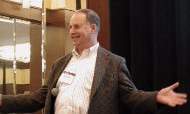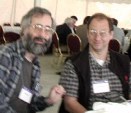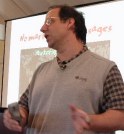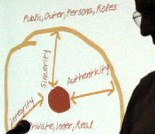danbricklin.com/log
|
||
|
|
Starting May 19, 2002
Small Players Matter, Handspring Treo 180 two months later, Connectivity 2002, David Weinberger's new book
19May02-05Jun02
2002_05_19.htm
|
|
|
Small Players Matter [link]
While large players and big media companies act like they are the main reason for the web and Internet and therefore should drive policy decisions, the numbers show that the contributions of the myriad of small players -- individuals, non-profits, and small businesses -- are crucial to the vitality of the web and its value to people. I wrote an essay where I look at numbers from Overture.com and Nielsen/Netratings. For example: "The term 'Bed and Breakfast' at 145K [search queries] is more popular than Jennifer 'Rachel' Aniston of the hit TV show 'Friends' or her movie-star husband Brad Pitt (136K and 131K, respectively). 'Lawyer' (117K) is just a little less popular than 'teen sex' (200K)...Out of hundreds of millions or billions of queries processed by Overture each month, even 'sex' seems unpopular since it's part of only 3.4 million requests. Of course, even the 'popular' terms are often used to find web pages created by regular people and small businesses. If Disney or Yahoo! had all you wanted, why would you need Google?"
Read "Small Players Matter".
Handspring Treo 180 two months later [link]
I still like my Handspring Treo 180 two months after my review. With the release of their new color units, and the phone-less Treo 90, I thought it was time to let people know if I was still using it. I am, and I think the combination (phone, PDA, keyboard implemented the way they did, size) is a big win. Read "Handspring Treo 180: Two Months Later".
Connectivity 2002 [link]
I put a write-up of some of my notes from the Pulver Connectivity 2002 conference on Satn.org. Here are a couple of pictures I didn't get to put there (I didn't take many):
  David Isenberg speaking, me and David Weinberger at lunch (there were lots of "Davids" at this conference) taken by Halley Suitt with my camera
In my write-up, I list some of David Reed's slide points. He applies the concept of "options" to the End-to-End Argument as well as user financing. (An option is a "right" to invest money or effort or whatever at a future time, but not the "obligation" to do it. After spending money for an option, you only have upside, since you can abandon what you thought you might want to do. If you commit to something -- i.e., not an option -- you still have to do it even if something better comes along.) He shows that there is provable economics behind the End-to-End Argument (the Internet has already shown the practical proof). He also reminds us how important user financing is to making large infrastructure possible, and why it is has an economic basis, too (in addition to helping cars, faxes, PCs, LANs, 802.11b, etc., happen despite more centrally controlled and deployed alternatives).
David Weinberger's new book [link]
In my write-up of the Nantucket Conference a couple of weeks ago I talked a bit about David Weinberger's new book, "Small Pieces Loosely Joined" [link to Amazon]. I wrote that report on the airplane on the way to the Miva Conference. Impressed by David's talk in Nantucket, I started reading the book when we weren't allowed to have our laptops on. When I finished the conference write-up, I continued to read and read. It's a wonderful book, very thought provoking and very readable. By the time I landed back in Boston I was finished all 196 of the small pages. I think readers of this web log who like my "idea" essays will like it as much as I did. I've quoted from it enough times since then that I felt I should mention it here. You can learn more on the book's web site. You can read the first few chapters in full there, if you want.
   David Weinberger delivering his speech based on the book to the Nantucket Conference, a slide about our Priavte Inner vs. our Public Outer selves (there are no illustrations in the book, unfortunately, so you'll have to watch him speak), David outside after the talk
Here are some excerpts:
Our real-world view of space says that it consists of homogenous measurable distances laid across an arbitrary geography indifferent to human needs; the Web's geography, on the other hand, consists of links among pages each representing a spring of human interest. Real world time consists of ticking clocks and the relentless schedules they enable, while on the Web, time runs as intertwining threads and stories. In the real world, perfection is held as an ideal we humans always disappoint; on the Web perfection just gets in the way. In the real world, social groups become more impersonal as they get larger; on the Web, individuals retain their faces no matter what the size of the group - even in the "faceless mass" of the public. In the real world, we have thinned our knowledge down to a flavorless stream of verifiable facts; on the Web, knowledge is fat with stories and voice. Our "realistic" view of matter says that it's the stuff that exists independent of us, and as such it is essentially apart from whatever meanings we case over it like shadows; the matter of the Web, on the other hand, consists of pages that we've built, full of intention and meaning. In the real world, to be moral means we follow a set of principles; on the Web, morality looks like prissiness and authenticity, empathy and enthusiasm instead guide our interactions.
Chapter 1: "A New World", Pages 24-25
...In fact, the Web feels spatial because it is a linked assemblage of places - meaningful, significant spots, each different.
This is the Web's nature, for everything on it was put there by a human being for a reason. In building a site, we are saying that we find this topic interesting and we think others will also. Sites that work make manifest their passion. So, of course the Web inevitably is a plenum of places that have meaning and matter at least to someone.
But on the Web we experience something we can never experience in the real world: places without space. Instead of needing a containing space to enable movement, the Web has hyperlinks. Links are at the heart of the Web and the Web's spatiality. The fact that the linked pages come from many people turns the Web into a place larger than we are. It is a public place, a place we can enter, wander, and get lost, but cannot own. Since place and space have been inseparable in all of our experience in the real world until now, when we experience the Web's place-ness, we assume that it must also have the usual attributes of spatiality, including the accidental nature of geography. That makes it easy to lose sight of the fact that what holds the Web together isn't a carpet of rock but the world's collective passion.
Chapter 2: "Space", Page 56
|
||
|
© Copyright 1999-2018 by Daniel Bricklin
All Rights Reserved.
|
||